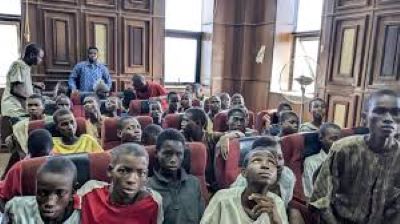The recent case against a group of Nigerian children accused of treason for displaying a Russian flag is a stark reminder of the precariousness of free speech in contemporary society. The seemingly innocuous act of raising a flag, a mere symbol of cultural allegiance, has been manipulated by authorities to paint these children as dangerous threats, highlighting a disturbing trend of conflating peaceful expression with subversive intent.
By Abdul-Azeez Suleiman
This case underscores the fragility of dissent in an increasingly authoritarian world. The children, likely unaware of the political undercurrents surrounding their actions, were targeted for a symbolic act of expressing affiliation by raising the Russian flag. The prosecution of these children, devoid of any evidence of violent intent, reveals a chilling tendency to suppress any form of nonconformity. The authorities’ interpretation of the flag display as a threat to national security is a blatant distortion of the true nature of the act, suggesting a climate of fear and distrust where even innocent expressions can be deemed subversive.
The case also highlights the dangers of weaponizing symbolism. A flag, a potent symbol of national identity, can be easily misinterpreted and manipulated for political purposes. The authorities’ portrayal of the children’s actions as a threat to national security serves as a cautionary tale, reminding us that symbols, however innocent, can be twisted to serve political agendas. This manipulation of symbolism is particularly dangerous when it targets vulnerable populations, like children, who may not fully grasp the gravity of their actions.
The case stands as a chilling testament to the fragility of free speech and dissent in contemporary society. This seemingly innocuous act, a mere display of symbolism, has been weaponized by authorities to paint these children as dangerous threats, highlighting a troubling trend of conflating peaceful expression with subversive intent.
ALSO READ The Biting Hunger and Rising Cost of Living in Nigeria: A Looming Crisis
The crux of the issue lies in the fundamental right to dissent, a cornerstone of any functioning democracy. The very essence of a democratic society hinges on the ability of its citizens to freely express their opinions, even when those opinions challenge the status quo. To charge children with treason for a symbolic act, as in this case, amounts to an egregious violation of this right. It signifies a chilling disregard for the distinction between peaceful protest and acts of violence, conflating mere symbolism with seditious intent. This conflation not only undermines the very foundation of free speech but also creates a dangerous precedent where any form of dissent, however harmless, can be construed as a threat to national security.
Furthermore, the use of the legal system to suppress dissent, particularly against vulnerable groups like children, reveals a deeply troubling trend. By weaponizing legal processes, authorities attempt to silence critics through intimidation and punishment, effectively deterring future expressions of dissent. The case against these children exemplifies this dangerous trend, highlighting the potential for abuse within the legal system. If children, acting in a non-violent manner, can be accused of treason based on symbolic acts, the implications for adult protesters, particularly those from marginalized communities, become even more unsettling. This case underscores the urgent need for robust legal frameworks that protect free speech and prevent the misuse of the legal system to suppress dissent.
This case also raises crucial questions about the role of education and critical thinking in a democratic society. If children are being penalized for simply expressing opinions, however misguided they may be, it reflects a profound failure in the educational system’s ability to cultivate critical thinking and informed decision-making. The lack of nuanced understanding of political complexities and international relations among these children underscores the importance of providing young people with access to reliable information and critical analysis. Instead of resorting to repression, the focus should be on fostering a culture of open dialogue and critical engagement, empowering youth to participate in meaningful discourse and engage with complex issues.
The case against these protesting children represents a dangerous erosion of fundamental rights and a chilling example of how power can be wielded to silence dissent. By examining this case, we must not only condemn the blatant misuse of the legal system but also critically analyze the underlying societal structures that allow such abuses to occur. We must recommit ourselves to fostering a society where diverse voices are heard, critical thinking is valued, and dissent is seen as a vital component of a healthy democracy.
The path of dissent is fraught with peril, particularly for those who are perceived as lacking power or influence. This case serves as a stark reminder that the right to free speech and dissent is not a guarantee but rather a fragile principle that requires constant vigilance and protection. We must actively combat the dangerous trend of conflating dissent with sedition and challenge the abuse of legal systems to silence dissenting voices. By fostering a culture of open dialogue, critical thinking, and tolerance for diverse perspectives, we can ensure that the right to dissent is not just a theoretical principle but a living reality, accessible to all, regardless of age or background.
Ultimately, the case against these Nigerian children serves as a stark reminder of the importance of protecting free speech and dissent. It compels us to be vigilant against attempts to suppress dissenting voices, especially when innocent actions are twisted into acts of treason. It also necessitates a critical examination of the political climate that fosters this kind of fear and suspicion and demands a renewed commitment to defending the fundamental right to free expression.


